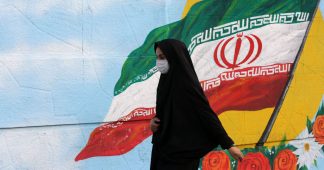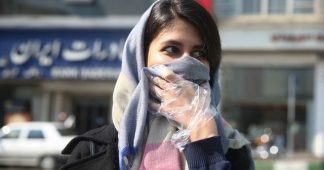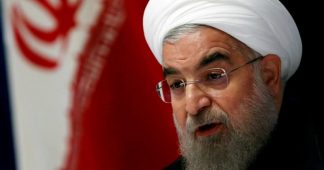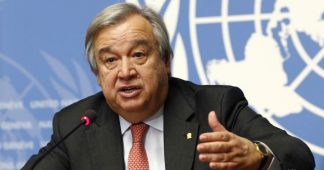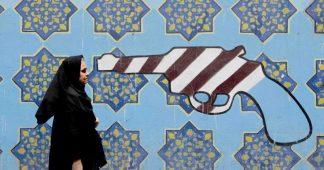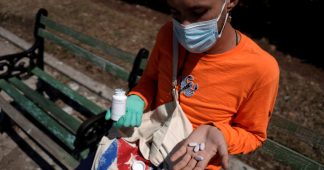US sanctions are devastating in ordinary times. But with the COVID-19 pandemic raging, they’re killing more people than ever.
By Greg Shupak
March 26, 2020
Subjecting people to such cruelties is indefensible in ordinary times: in the pre-COVID-19 world, America’s economic warfare was killing cancer patients in Iran, keeping Syrian children with cancer from getting necessary medicines, and, according to an estimate by two US economists, killing perhaps forty thousand Venezuelans. But collectively punishing entire populations during a global pandemic is perhaps an even more ruthless form of barbarism.
The coronavirus is ravishing Iran, with the country reporting more than twenty thousand cases and over 1,500 deaths. Prior to COVID-19, US sanctions battered Iran’s health care system, undercutting access to pharmaceuticals and necessities like cardiac pacemakers. In December, Eskandar Sadeghi-Boroujerdi described the sanctions as “the collective punishment of over eighty-one million Iranians through and by means of one of the most comprehensive and unrelenting sanctions regimes in modern history.”
US secretary of state Mike Pompeo cannot be taken seriously when he claims that “humanitarian assistance to Iran is wide open, it’s not sanctioned.” Sanctions have hampered Iran’s ability to contain the outbreak, sabotaging economic growth, preventing Iranians from accessing Johns Hopkins University’s real-time coronavirus database, and leading Google to remove Iran’s coronavirus diagnosis app from its online store.
While the sanctions may not explicitly prohibit humanitarian items, the financial attack on Iran has made some companies unwilling to export critical supplies for fear of a US government backlash. Amid the pandemic, Washington has said that it will not provide sanctions relief. In fact, it is upping its attack on Iran, adding further sanctions as part of its “maximum pressure campaign” to decimate Iran’s oil sector — any measure that makes a country poorer necessarily leaves it in a worse position to respond to a pandemic.
Meanwhile, Syria has its first confirmed COVID-19 case. To put it mildly, the country is poorly positioned to deal with the pandemic, not only because of the nine-year-long war there but also because US sanctions have had the effect of making the import of medical instruments and other medical supplies almost impossible.
Despite supposed humanitarian exemptions, sanctions have hit Syrian health care, affecting procurement of medicines by preventing transactions with foreign banks and stopping many international drug companies from dealing with the country. The Trump administration has gone so far as to forbid the passage of aid ships to Syria — the European Union and Canada have also levied sanctions against the country.
Elsewhere, the Palestinian Health Ministry has reported the first two cases of coronavirus in Gaza, a territory that Israel has rendered almost unlivable. The United States directly participates in the siege of Gaza by providing Israel with the weapons and the financial and political support it needs to torture Gaza residents. Washington has also had sanctions of its own on the Hamas government in Gaza since it was first elected and has continually upped the assault.
Similarly, in Yemen, the United States has, through a combination of direct participation and subcontracting — this time via its Saudi and UAE partners — annihilated the health care system with military and economic warfare. Thus, in the likely event that Yemen has or soon acquires coronavirus infections, a horrific toll is all but certain.
Things will be at least as devastating in North Korea. UN Security Council (UNSC) sanctions on the state cover approximately 90 percent of its commercial exports, preventing it from importing oil, gas, and refined petroleum products, and the United States’ additional unilateral sanctions are even more comprehensive.
Sanctions against North Korea have blocked anesthesia machines used for emergency operations, while making it difficult for aid agencies to operate in the country. The measures don’t allow North Korea to import computers or metal objects, which restricts its ability to repair medical equipment. The UNSC’s list of banned items includes “sterilizers, ultraviolet lamps for disinfection, ambulances, syringes, needles, catheters, X-ray and ultrasound machines, [and] microscopes as well as machinery for filtering or purifying water”; although the UNSC can make case-by-case exemptions for humanitarian aid, this mechanism does not allow humanitarian organizations to deliver necessary items, such as equipment for medical emergencies, in a timely manner.
The first shipments of international medical aid are due to get to North Korea this week to help with the coronavirus, but, on top of softening up the country for COVID-19, the sanctions’ mandatory waivers for such items helped delay their arrival.
Cuba, a nation that has been at the forefront of coronavirus aid efforts, is also impacted. According to the United Nations, an almost-sixty-year US embargo has cost the island $130 billion. Over the last year, the United States has hit Cuba with some of the harshest measures in its decades of war on the nation and, in April, Washington instituted sanctions against tanker companies delivering petroleum to Cuba from Venezuela, severely damaging Cuba’s agricultural sector.
Now Cuba has its first coronavirus patients, and, though it has a world-class health care system, its ability to cope would have been stronger had the Trump administration’s recent moves not left it poorer.
US sanctions are also an important cause of a public health crisis in Venezuela, crushing the economy, blocking the nation from exporting oil, freezing its global financial assets, and denying it access to international financial systems, contributing to a shortfall of $38 billion in the last three years and “prohibiting the importation of essential, lifesaving products.” Venezuela now has its first two COVID-19 cases, as US sanctions are laying waste to social spending and leading to shortages of food and medicine.
Quite simply, the sanctions regime is sentencing thousands to their deaths. That these sanctions need to be lifted in the face of COVID-19 should be an uncontroversial humanitarian imperative.
